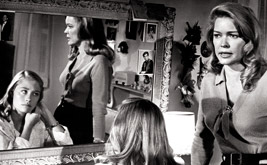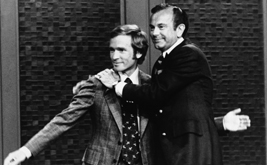Letters Letters
Kudos on ‘Arab Awakening’ Shoreline, Wash. Your special issue on the Arab Awakening [Sept. 12] is one of the best in years. Great in-depth coverage we’ll never get in the commercial press, giving real dimension to the various movements and changes in the Middle East and North Africa. Thanks to all your contributors and editors. CHRIS NIELSEN Love and Honor but, Above All, Obey Shippensburg, Pa. Katha Pollitt’s examination of the contradictions in which Michele Bachmann has become enmeshed—putting herself forth as a leader while at the same time holding to St. Paul’s directive that wives be submissive to their husbands—is right on target; it reminds me of the heartfelt denunciations decades ago by a bestselling novelist of such biblical passages [“Subject to Debate,” Sept. 12]. Pearl S. Buck, who grew up in China the child of American missionaries and who knew a thing or two about the fundamentalist mindset, wrote in her bittersweet 1936 biography of her mother, The Exile: “Since those days when I saw all her nature dimmed I have hated Saint Paul with all my heart and so must all true women hate him, I think, because of what he has done in the past to women like Carie [Buck’s mother], proud free-born women, yet damned by their very womanhood.” In his February 12, 1936, review of the book in The Nation, Mark Van Doren quoted these powerful lines, which are, unfortunately, back in the news long after we would have thought they’d be relevant only to historians. ROBERT SHAFFER Shrinking Prisons? Ionia, Mich. The Sentencing Project’s report that Michigan “has closed twenty-one facilities” since 2002 is misleading [“Noted,” Sept. 12]. I have watched from the inside for twenty-nine years. Many of the reported closures have simply been consolidations. In the 1980s and ’90s Michigan built regional brick-and-concrete prisons (population about 1,200) with adjoining “temporary” prisons (pole barns, population about 1,000). Many of the temps have been closed on paper in the past decade and placed under the administration of the adjoining regional. The total population of the remaining prison is the sum of the temp and the regional. People are still in the beds of these “closed” prisons. RAYMOND C. WALEN JR. Bigots Turn on the Spigots Los Angeles Mark Oppenheimer needs to spend less time reading philosophy and more time reading the newspaper [“Sentimentality or Honesty?” Aug. 29/Sept. 5]. He claims that in the United States “even outright bigots tend not to think anymore that their bigotry should be written into the law” and that “America pretty uniformly sides with liberal democracy.” Is Oppenheimer oblivious of the fact that in a convulsion of Islamophobia, bigots in more than twenty-one states are pushing legislation to ban Sharia? Or that across the country bigots have tried to write their bigotry into law by persuading zoning boards and land commissions to block the building of mosques? We have a long way to go before we can blithely conclude that America uniformly sides with liberal democracy. STEPHEN ROHDE Oppenheimer Replies New Haven, Conn. I am grateful for Stephen Rohde’s letter, a useful reminder that many Americans, in particular Muslims, still face bigotry. I do not think I was being “blithe” when I wrote that in the United States the bigots “tend” not to push laws promulgating bigotry; a useful contrast would be France, where the movement to ban the burqa has wide and vocal support, or Germany, which truly oppresses Scientologists. In America, what is extraordinary are not the predictable outbursts of xenophobia but the strong resistance to them. We Americans get a lot wrong—our wars, our drug laws, our tax code—but we get religious liberty right. MARK OPPENHEIMER Spirit of Japan Laramie, Wyo. Re Hitonari Tsuji’s contribution to “Life After Fukushima” [Aug. 29/Sept.5]: What a beautiful way to express conditions in Japan after the double disasters of March. Tsuji’s words sum up for me what I have always felt was, and is, the spirit of the Japanese people. His words moved me as words have not done for a long time. “Even in the flood zone thick with mud, the cherry blossoms bloomed.” I hope they will continue to do so for a very long time. JO AELFWINE Easy Writer Gunbarrel, Colo. Kudos to The Nation for running Heather Hendershot’s meaty arts piece on the BBS boxed set from Criterion [“Losers Take All,” May 30]. While Hendershot’s otherwise freewheeling and perceptive analysis is focused on the “rise and fall” of the New American Cinema of the late ’60s and early ’70s and the “heroic new directors” who led the charge, nowhere are writers to be found in her mythological remixing. Saying Easy Rider “owes its coherence entirely to Nicholson’s performance” roils the ghost of Terry Southern—who based the George Hanson character on a Faulkner archetype miles beyond Hopper’s or Fonda’s literary ken. My father’s deft touch (much sought-after at the time) is evident throughout the film—from its American gothic tone and “iron in the soul” world-weary hipsterdom to the clear-speaking, dope-infused dialogue (also found in Terry’s Red Dirt Marijuana) that lyrically articulates the irrelevance and danger of establishment culture’s lingering and violent prejudices. As the creative team’s “elder,” and the only one with credibility at the time, Terry provided cohesion on the page and on the set, and helped secure Academy Award nominations for all three “writers.” While the BBS story is inspiring, my father’s oft-forgotten producing role on Easy Rider is a dark unspoken mark against the Raybert team—their decision to cut him out of their “big score” with Columbia clearly paved the way for what nice guys could expect from old friends in the new era of independent film. NILE SOUTHERN Hendershot Replies Brooklyn, N.Y. Terry Southern was undoubtedly treated poorly by Raybert (the predecessor to BBS), as well as by Peter Fonda and Dennis Hopper. One suspects that much of the blame lay with Hopper, whose behavior teetered between erratic and psychotic throughout the production of the film. A fully verifiable account of l’affaire Southern will probably never emerge, given that so many of the witnesses were high as events unfolded; but the upshot is indisputable: Southern received a flat fee and no share of the film’s impressive box office profits. Regardless of who really wrote Easy Rider and who deserved credit (or cold hard cash), though, I would maintain that the film’s strength is not its script. Some of the dialogue may be clever, but much of it is sluggish and heavy-handed, and the plot is underwhelming. The film’s photography and music are responsible for most of its compelling moments. Nicholson brings terrific energy to the picture as well, playing a character with only a modicum of screen time and not enough depth to evoke Faulkner, for this viewer at least. Nile Southern is quite right, though, to observe that the New American Cinema was not a utopia of “nice guys.” Their treatment of the women in their lives was particularly reprehensible. Luckily, the films often transcended the flaws of their makers. HEATHER HENDERSHOT Correction Patricia J. Williams’s column “Sex, Lies and the DSK Case” [Sept. 19] contained an inaccuracy regarding Nafissatou Diallo’s asylum application. Diallo did not lie on her application about being gang-raped in Guinea. Rather, she falsely claimed to prosecutors that she had been gang-raped and that she had reported the fabricated incident on her asylum application.
Sep 27, 2011 / Our Readers, Mark Oppenheimer, and Heather Hendershot

Losers Take All: On the New American Cinema Losers Take All: On the New American Cinema
How B-movie directors and young mavericks rattled Hollywood's dream machine.
May 11, 2011 / Books & the Arts / Heather Hendershot

Fame is a Bee: On Dick Cavett Fame is a Bee: On Dick Cavett
A talk-show like Dick Cavett's, intelligent but not intellectual, offered television a new twist.
Nov 4, 2010 / Books & the Arts / Heather Hendershot
My So-Called Independents My So-Called Independents
Will TV's new world of branding and product integration destroy small independent productions?
May 29, 2008 / Books & the Arts / Heather Hendershot
